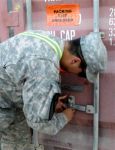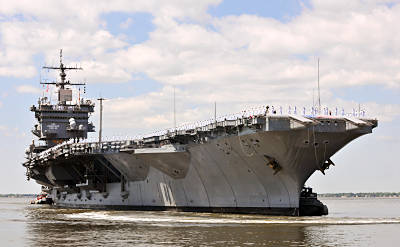CONTINGENCY OPERATING BASE ADDER, Iraq — The number of units packing up equipment and personal belongings is increasing as the U.S. military prepares to depart Iraq at the end of the year.
But, everything that’s shipped to the states from Iraq must first go through a thorough inspection. All customs inspections here go through Army Sgt. Thomas Vice II, customs project manager, 239th Military Police Company, from Alexandria, La.
“Anything that’s going home has to go through customs,” Vice said. “To start, the units have to send in a customs request form. The standard operating procedure is to get the request in at least 10 days prior to the inspection. That way I’ve got time to make sure everything is right.
“I make sure that the date for inspection is clear and that we have a stamp reserved for that date,” he continued. “After the inspection is completed, the paperwork is signed and stamped with an official customs stamp that certifies the cargo in the container has been properly inspected.”
Soldiers prepare their equipment and personal gear prior to the inspection by placing it on the ground in organized sections.
The customs inspector then briefs soldiers on the inspection process and goes over the list of items that are not allowed to ship. All items to be inspected are positioned in front of large metal shipping containers — known as conexes — used to transport equipment and gear.
“It’s a 100-percent inspection,” Vice said. “You might have a 20-foot conex with 80 duffle bags and 60 foot lockers, all with personal gear, and everything has to be dumped out, sifted through and inspected.”
An average unit inspection takes about three to four hours for a seasoned inspector, he said, noting the time it takes to complete an inspection depends on how much equipment or gear the unit has.
“One of the main things that we look for is cleanliness, because any kind of organic matter — dirt, sand, grass, plants, anything like that — is an absolute no-go,” Vice said. “We don’t want anything messing with the ecosystem back home, and we’re trying to prevent that from happening.”
Some soldiers may not understand the environmental concerns involved with the inspection process, said Sgt. Julian A. McKinnon, customs border control pre-clearance agent, 1st Cavalry Division, from San Antonio.
“It’s really important, especially at the port cities, because when containers are opened and something bad is in there like animal products or soil … you could get bacteria that can be harmful back in the states.”
Vice said customs inspectors also look for numerous illegal items.
“You can’t have pornography, alcohol, drugs, or illegal weapons,” he said.
And, some people “try to bring their protein powder or work-out supplements with them,” Vice said. “Well, if the seal has been broken, they can’t bring it.”
The most effective way to find an illegal substance is to use sniffer dogs, he said.
“Sometimes we bring dogs,” Vice said. “The K‑9 unit works with us a lot, being that we’re the provost marshal’s office, but the decision to use them is nothing in particular. It’s just random.”
There have been no significant violations so far on COB Adder, Vice said. But the risk, he added, is always present.
Beyond illegal drugs, weapons and organic materials, there is another concern that has developed since the beginning of the U.S. presence in the Middle East, Vice said.
Some soldiers would buy a lot of DVD’s from the Iraqi vendors and ship them home, he said, noting the rules have become stricter. Now soldiers are limited to one DVD title or one box set.
Once containers are inspected, signed off on and sealed here, they go to Kuwait, where they are shipped to the states, Vice said. At that point, he said, all containers in Kuwait are subject to another customs inspection. That inspection is done randomly to at least 10 percent of the containers.
“If they get 500 conexes in that day, they’re going through 50 of them, Vice said. “That’s more or less making sure that we’re doing our job; that we don’t miss things.”
For the most part, he said, soldiers understand the necessity of the inspections.
“Agriculturally, it helps the farmers from losing money due to bacteria or plant diseases that could be transported from here to the states,” Vice said. “It also helps to keep untraced and unmarked weapons off the streets.
“We’re not out to ‘get’ people,” he added. “It’s not about that. It’s about doing the right thing and the safety of the soldiers.”
Source:
U.S. Department of Defense
Office of the Assistant Secretary of Defense (Public Affairs)

 von
von 
